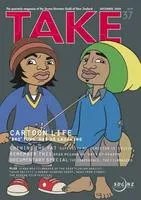Profile of TVNZ Commissioning Editor - Jude Callen
Written by

Courtesy of TAKE the magazine of the New Zealand Screen Directors Guild.
Jude Callen, Commissioning Editor at TVNZ, has worked in television for the past 25 years in a variety of roles. She started out as a publicity writer for TVNZ at Avalon but quickly recognised that she "wanted to play with pictures as well". This led to a move into promos and then into the 'Rock Unit' directing and then producing a number of contemporary music shows.Courtesy of TAKE the magazine of the New Zealand Screen Directors Guild.
Jude Callen, Commissioning Editor at TVNZ, has worked in television for the past 25 years in a variety of roles. She started out as a publicity writer for TVNZ at Avalon but quickly recognised that she "wanted to play with pictures as well". This led to a move into promos and then into the 'Rock Unit' directing and then producing a number of contemporary music shows.After shifting to Auckland, Callen worked as a freelance director in a range of programme genres, but ultimately focussed on documentary and in recent years more often than not she has undertaken the role of producer or executive producer. About her most recent position, Callen says:
'I was not specifically seeking a job change but when the commissioning role at TVNZ was split into various genres I saw an opportunity to take my specific interest in documentary-making into another zone. I have always been a practitioner and thought that this role might help bridge the gap between programme-maker and broadcaster.
In an e-mail exchange, Jude Callen discusses TVNZ's commissioning policy and how she would like to encourage more local programmes on our screens.
TAKE: How do you see your role in terms of encouraging New Zealand directing talent?
Quite simply TVNZ wants and needs to have more quality local productions on TV One and TV2 so my role is to act as a link between the programmers and the programme-makers. In a sense the programmers give the commissioners the shopping list for the strands they require and then we go shopping for the best story ideas and the programme-makers who can execute them. I want to provide an environment that encourages producers and directors to share their ideas with me, maintain an open door policy, keep them informed of any changes in programming policy and support them as required during production of their projects. I also want to encourage emerging directors by providing opportunities for them to have their work broadcast. I see the whole process as a collaborative one and, most importantly, it should be a positive one for all concerned because ultimately we all want the same thing.
What kind of work is TVNZ looking for?
We are aiming to have 50 per cent local content by 2008 so we are looking for the best ideas for every genre. Bring it on!
Are ratings still paramount to the ethos of TVNZ?
If you have a great story to tell why wouldn't you want the most people to see it? And how will you know if they have seen it and liked it? Our current ratings system is one way of quantifying that very thing.
Has the Charter made a difference to programme commissioning?
The Charter was in place when I became a programme commissioner so I can't give you a 'before and after' answer. However, in my genre I want to see strong, compelling stories about New Zealanders for New Zealanders. I don't see meeting Charter requirements as being any sense of enforced obligation. I see it as the perfect opportunity to share our stories. A documentary-maker's heaven!
The recent New Zealand Festival season of documentaries was very progressive programming. How did it come to be commissioned?
I would happily claim some form of association with this series but the reality is that it was commissioned by my predecessors Carolyne Meng Yee, Karen Bieleski and Tony Holden.
What has been the feedback about the series from within TVNZ?
The ratings were good and consistent, the feedback was without exception positive, the producers, directors and their production teams seemed to enjoy the challenge and delivered quality programmes. Are there plans for another series? We are already commissioning but we want more!
Are you finding more of an audience for documentaries?
New Zealand audiences have always enjoyed documentaries. They like to be informed, they revel in being challenged, they are up to being taken to places they've never been to before. As broadcasters and programme-makers we have a huge responsibility to offer up stories that satisfy this passion. The better we are at doing this the more audience we will find.
Some programme-makers complain about the small budgets for TV programmes. They see it as an unfair advantage in terms of trying to compete in the international market. Can you see it improving?
I'm a pragmatist. A realist. With my producer's hat on I've whinged and moaned with the best of them about the constraints of available funding but in the end I have made the decision to proceed or not. We have a small population and this determines current funding parameters within which we have to operate.
However, despite having great expectations, the funding cake can only be so big. My attitude is that we should all continue to look for ways to make sure our projects are well resourced but we should also continue to get our stories told. Providing quality documentaries for New Zealand viewers is our aim. Should these stories have a relevance to an international market all well and good. However, our priority is to tell our stories to our people.
Other stories in this issue of TAKE include Brad McGann on 'Days of Heaven', an interview with Morgan Spurlock of Supersize Me, Boys in the 'burb director Maka Makatoa....and more